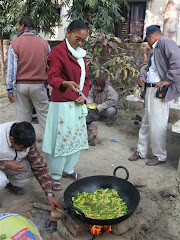Although we will miss the colours of Nepal, from the brilliant reds, purples, oranges, pinks, yellows and electric blues of the women’s saris, to the fuchsia pink and turquoise stripes on the goats and the bright green rice paddy, we will not miss the Holi festival. This has become an excuse for riotous young men to cover themselves and everyone they meet in brilliantly coloured powder, followed by squirting of water to ensure that the colour sticks fast. I have just returned from a quick outing to the shops – which of course were all shut tight to avoid the coloured assault, and managed to escape unscathed by cheerily waving and shouting “Holi shubhakamana” as I sped past on my bike. I did allow the little girl next door to daub a little colour on ‘auntie’s’ face when I returned home.
I will be sad to leave the English teachers a week before their training is complete, and David has already said a last goodbye to his teachers and children. The flat is gradually being emptied, as friends come to collect items of furniture. Durga arrived with two handcarts yesterday morning and carted off the big furniture, so we are reverting to camping out as we did at the beginning. We have had many invitations to farewell daal bhats; impossible to attend them all. The main farewell events were on Thursday. David arrived as Bal Rani at 9.30am as requested. Preparations were underway and the proceedings started an hour later. Many speeches were made, including one by David in Nepali, followed by presentation of gifts – a beautifully written and framed certificate extolling the virtues of Sir David Spinney, and a huge box wrapped in Barbie doll paper that he was instructed not to open until he got home. He was then anointed with a tikka by everyone (stripe of brilliant red powder on the forehead), covering head, hair, nose and shirt. Worse than Holi. He arrived at the ETC in the afternoon looking as if he had a nasty head injury. The trainers, head of Adarsha school and all my English teachers were formally arranged for speeches. We performed dutifully, but then in the interests of active learning, taught them a song with actions. We were given beautiful shawls, topi (Nepali cap) for David and bag for me. Then tikkas from 37 people. When we arrived colourfully home, we found there was no water, so continued to Hanna’s for a shower. When we opened David’s gift box, it contained a Nepali ‘harvest festival’ collection of fruit and vegetables – some of which we’ve enjoyed this evening but will not be able to transport home! The last of the furniture and household goods will disappear on tomorrow, and we leave for the airport on Saturday morning, much lighter both in body and in luggage than when we arrived.
There is so much we will missas well as Nepali friends: being woken by early morning temple music and the wailing of the imam, sunlight through the palm trees as we eat breakfast on the terrace each morning, children shouting ‘hello didi’ in the mornings as I cycle to work along potholed roads, the always fascinating and changing pattern of street life, ox carts patiently hauling huge loads along the road, watching the cows and goats amongst the children on the school field, the ragged boy who brings me tea in the afternoons, being given a sweet from ‘Mr India’s’ big jar, like a small child every time I buy anything, the mango season, chaat stalls wheeling through the streets in the afternoon, grazing water buffalo outside the gate when I arrive home, negotiating the cows in Main Road market in the evenings, masala dosas and chocolate ice cream on Fridays, chirruping geckoes, the daily evening challenge of the Himalayan Times crossword … and writing this blog.
We will be back in England on March 26.
.jpg)
.jpg)







.jpg)
.jpg)
.jpg)
















.jpg)



















